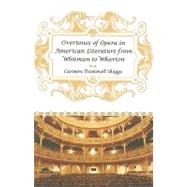Overtones of Opera in American Literature from Whitman to Wharton
, by Skaggs, Carmen Trammell- ISBN: 9780807134917 | 0807134910
- Cover: Hardcover
- Copyright: 1/1/2010
Reverberating Voices: Overtones of Opera in American Literature from Whitman to Wharton explores the discourse of opera-both the art form and the social institution-in selected works of Whitman, Poe, Alcott, Chopin, Cather, James, and Wharton. While literary critics have embraced musical terminology to evoke what Lindenberger describes as a "nonverbal dimension beyond what we ordinarily take to be the realm of literature," many of these same scholars have been wary of embracing operatic forms and conventions. After all, the "operatic" often suggests absurdity, artificiality, irrationality, and extravagance. Despite the undisputed canonical status of some of the works included in this study, others might be described in similarly operatic (and disparaging) terms: contrived, artificial, or bizarre. The critical discourse of opera offers the ideal vehicle for considering these texts in a new way. For Whitman, Chopin, Alcott and Cather, opera provided a powerful artistic medium for expressing a private aesthetic experience. Each recognized that the artifice and convention of opera did not detract from its ability to illustrate unbridled passion and emotion. In opera, they discovered the embodied voice of the artist. Others, like Edgar Allan Poe, Henry James, and Edith Wharton, found not only the spectacle of opera but also its spaces, the opera houses and boxes, perfectly suited for displaying the class-based and commodity driven aspirations of America's new aristocracy.







